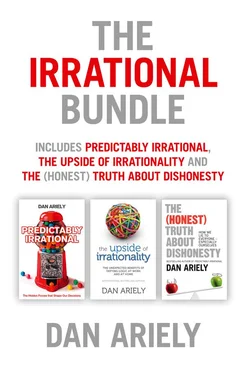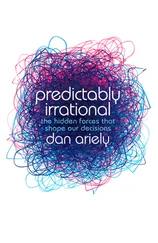Dan Ariely - The Irrational Bundle
Здесь есть возможность читать онлайн «Dan Ariely - The Irrational Bundle» — ознакомительный отрывок электронной книги совершенно бесплатно, а после прочтения отрывка купить полную версию. В некоторых случаях можно слушать аудио, скачать через торрент в формате fb2 и присутствует краткое содержание. Жанр: unrecognised, на английском языке. Описание произведения, (предисловие) а так же отзывы посетителей доступны на портале библиотеки ЛибКат.
- Название:The Irrational Bundle
- Автор:
- Жанр:
- Год:неизвестен
- ISBN:нет данных
- Рейтинг книги:3 / 5. Голосов: 1
-
Избранное:Добавить в избранное
- Отзывы:
-
Ваша оценка:
- 60
- 1
- 2
- 3
- 4
- 5
The Irrational Bundle: краткое содержание, описание и аннотация
Предлагаем к чтению аннотацию, описание, краткое содержание или предисловие (зависит от того, что написал сам автор книги «The Irrational Bundle»). Если вы не нашли необходимую информацию о книге — напишите в комментариях, мы постараемся отыскать её.
The Irrational Bundle — читать онлайн ознакомительный отрывок
Ниже представлен текст книги, разбитый по страницам. Система сохранения места последней прочитанной страницы, позволяет с удобством читать онлайн бесплатно книгу «The Irrational Bundle», без необходимости каждый раз заново искать на чём Вы остановились. Поставьте закладку, и сможете в любой момент перейти на страницу, на которой закончили чтение.
Интервал:
Закладка:
What these results mean is that when price is not a part of the exchange, we become less selfish maximizers and start caring more about the welfare of others. We saw this demonstrated by the fact that when the price decreased to zero, customers restrained themselves and took far fewer units. So while the product (candy, in our case) was more attractive to more people, it also made people think more about others, care about them, and sacrifice their own desires for the benefit of others. As it turns out, we are caring social animals, but when the rules of the game involve money, this tendency is muted.
THE RESULTS FROM our experiment also help explain one of the great mysteries in life: why, when we are dining out with friends, taking the last olive feels like such a big deal.
Imagine you go to a friend’s birthday party. The appetizers are luscious: there’s a lovely spread of cheese and fruit; dishes of gherkins, kalamata olives, and tapenades; and lots of tiny little crostini. You walk around the room talking to old friends, and the wine is flowing. At some point, you wander into the kitchen and notice the delicious-looking four-decker Red Velvet cake (your personal favorite). As you chitchat with the other guests, you can’t stop thinking about that mouthwatering cake. All you really want to do is abscond with the entire thing, eat as much as you can in the laundry room without anyone knowing, and blame the dog if anyone asks. But what do you do? You balance your own desire with the desires of your friends, and you end up with only a medium-sized slice.
Recently, I was in an analogous situation with two of my colleagues and friends, Jiwoong Shin and Nina Mazar. If you’ve ever been to a sushi restaurant with friends, you know that as the California rolls and sashimi pieces on the plate in the middle of the table start to dwindle, the people sitting around it gradually become shyer about popping them into their mouths. At the end of our meal, there was one lonely spicy tuna left, and none of us seemed to be willing to put it out of its misery. When the waitress came to bring us the check and take away the plate with the lone sushi, I asked her how often people leave a single piece at the end of the meal. “Oh,” she said, “I find one extra piece left almost every time. I think it is even more common than people finishing all their sushi.”
Now I have eaten a lot of sushi in my life, and I can’t remember a time either when I was dining alone or when I got my own personal portion of sushi when I left anything on the plate. Somehow, when it’s just me who’s eating, I always manage to finish it all. But when the sushi is served in a large plate in the middle of the table, it just feels like taking the last one would be, well, a bit déclassé. “I really can’t eat any more,” I might say to my friends. “Go ahead. You take it.”
What is this sushi magic? Simply put, the communal plate transforms the food into a shared resource, and once something is part of the social good, it leads us into the realm of social norms, and with that the rules for sharing with others.
BACK TO OUR experiments, the next question we wanted to examine was whether the pattern of demand that we observed in the experiments was really due to the change from some payment to no payment. Or would it also happen when we discount prices of candies to anything above zero? According to the theory of social norms, this odd behavior of demand should manifest itself only when the price drops to zero—because only when price is not a part of an exchange do we start thinking about social consequences of our actions. Uri, Ernan, and I decided to take a closer look at this hypothesis in our next experiment.
This experiment worked much like the previous one, except we returned to the trusty and super-delicious Lindt chocolate truffles (which were by now an experimental staple for us). We offered the chocolates to passing students at a broader range of prices. We’d already seen what economists call a “backward sloping demand curve” when the price was reduced from 1¢ to free (meaning demand went down instead of up when the price decreased). What would happen to demand when we decreased the price from 10¢ to 5¢? From 5¢ to 1¢? Or, as in the first experiment, when we decreased the price from 1¢ to free?
When we dropped the chocolate prices from 10¢ to 5¢, the predictions of both laws of demand were verified, and in total we saw an increase in demand of about 240 percent. Similarly, when the price went from 5¢ to 1¢, the predictions of both laws of demand were verified, and in total we saw an increase in demand of about 400 percent. But, as we saw in our first experiment when we reduced the price from 1¢ to free, the first law of demand was verified (more people stopped for chocolate) but the second law of demand was disconfirmed (the people who took chocolate took less not more), and in total, with more people taking less, we saw a decrease in demand of about 50 percent.
What these results mean is that the theory of demand is a solid one—except when we’re dealing with the price of zero. Whenever the price is not part of the exchange, social norms become entangled. These social norms get people to consider the welfare of others and, therefore, limit consumption to a level that does not place too much of a burden on the available resource. In essence, when prices are zero and social norms are a part of the equation, people look at the world as a communal good. The important lesson from all of this? Not mentioning prices ushers in social norms, and with those social norms, we start caring more about others.
ANOTHER IMPORTANT LESSON from Chapter 4 was about the ability to obfuscate exchanges in nonfinancial terms and, by doing so, avoid squashing (“crowding out,” in economic terms) the benefits of social norms. (Giving your mother-in-law a gift is a good idea, but paying her for a wonderful Thanksgiving dinner is not recommended, even if both gestures would cost you the same amount of money.)
If obfuscation can provide an important wedge that keeps us humming along the social norm track, and if gifts are one mechanism for obfuscating, what about other such mechanisms? What about effort? Over the years, I have been a beta tester for many software products, and in retrospect, it is amazing to realize how much time and effort and how many computer crashes I have endured from this activity. Could it be that because these software companies asked me for my time and effort without offering money, I was eager and happy to help them, even at substantial cost to myself?
Now, effort is clearly not the same as a gift, but could it be that it is also different from money? Perhaps there’s a range with strict financial exchange norms at one extreme, pure social norms at the other, and effort somewhere along this spectrum? What, we wondered, might happen in a nonmonetary exchange involving only effort? Would effort undermine social norms in the same way that financial transactions do? Does an exchange of effort keep the social norms intact, similar to the effect of not mentioning money at all? Or might it fall somewhere in the middle of this spectrum?
To explore this notion, we set up a new experiment. This time, we had a research assistant roam around the MIT Media Laboratory with a tray that was always stacked with fifty Lindt truffles. In the “free” condition, she simply asked people, “Would you like some chocolates?” (Note the plural, which indicates that it would be acceptable to take more than one.) In the “monetary” condition, she asked, “Would you like some chocolates? The cost is one cent each.” Finally, in the “effort” condition, she handed people a stack of pages with random arrangements of printed letters. For every pair of s’s they found, she said, they could have a Lindt truffle (but they did not have to take one). They could work as long as they wanted, putting in as much or as little effort as they wished. (There were well over fifty pairs of s’s among all the sheets of letters, and it was very easy to spot them.)
Читать дальшеИнтервал:
Закладка:
Похожие книги на «The Irrational Bundle»
Представляем Вашему вниманию похожие книги на «The Irrational Bundle» списком для выбора. Мы отобрали схожую по названию и смыслу литературу в надежде предоставить читателям больше вариантов отыскать новые, интересные, ещё непрочитанные произведения.
Обсуждение, отзывы о книге «The Irrational Bundle» и просто собственные мнения читателей. Оставьте ваши комментарии, напишите, что Вы думаете о произведении, его смысле или главных героях. Укажите что конкретно понравилось, а что нет, и почему Вы так считаете.












